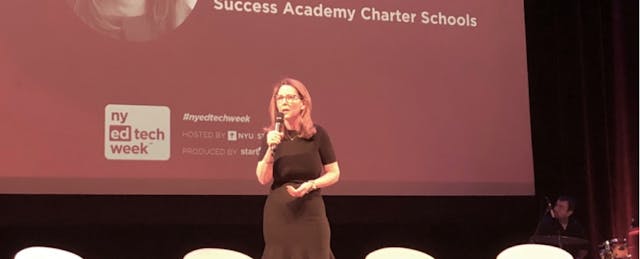Eva Moskowitz, the founder of New York City’s Success Academy, set the tone for this year’s NY Edtech conference by telling the crowd of 1,400 techies, entrepreneurs, researchers and educators that she may have some “unpopular perspectives” on edtech. Then, through her opening speech, she set out to put technology in its place.
“I think there is a tendency to see edtech as the savior of American education. I do not believe it is. I do not believe we get to extraordinary excellence or equality through edtech,” says Moskowitz, who spoke alongside school leaders from BASIS Charter Schools and East High EPO. “While that may be heresy, I believe education is a fundamentally human endeavor that involves motivating and inspiring students to develop a passion for learning. In that sense, edtech is not the answer.”

At Success’ 46 schools in the New York area, students perform at the top 5 percent on math, English and science state exams, and Moskowitz’s words carry weight in the city. During the conference, hosted by NYU Steinhardt, she used her voice to direct the edtech-friendly audience to where she felt technology could be used strategically in schools.
“While we are re-imagining what’s happening in schools day-in and day out, were are also re-imagining what a district looks like, and how the home office that supports the day-to-day work of schools looks. I think there is an enormous number of ways that we can digitize and automate,” Moskowitz explains.
Pointing to disorder in managerial-administrative tasks and teacher feedback loops, she encouraged edtech leaders to innovate in those areas. She also noted that audio books have done a lot to spark literary interest in her students, and encouraged entrepreneurs to invest in that space. Yet, when it came to student-facing work she noted teachers have the most important role to play—words that sparked discussions on Twitter.
Where is it helpful? Moskowitz says there are lots of opportunities for ed tech in the bookkeeping department, ie, the need to digitize student records and help with administrative issues. #nyedtechweek
— Lauren S. Camera (@laurenonthehill) December 19, 2017
@MoskowitzEva love what you do but not sure it’s helpful to talk about tech VS teachers. It’s a false dichotomy. Nobody here would disagree that supporting teachers/motivating students is the first priority #nyedtechweek
— Richard Culatta (@rec54) December 19, 2017
Take Chances, Make Mistakes and Get Messy—Just Not in the Classroom
Throughout multiple panel sessions, educators came back to the question of where technology belongs in schools, and how to work collaboratively with educators to create new tools.
One thing many of the innovators in the room seemed to agree on was that educators needed freedom to take more risks, make mistakes and sometimes even fail. Yet what failure looks like, and how that can be accepted in schools where the collateral is students, led to debate.

“Failure is a part of the innovation process and if you want teachers to be part of the process we have to recognize that there will be failures and missteps along the way,” says Vikas Gupta, CEO of Wonder Workshop during a panel on K-12 communication at the event. “I think one of the core facets of innovation is to fail fast and move on from it quickly. We want to contain it.”
Gupta notes that educators must make room for error, yet the tools they experiment with should have some form of demonstrated success so that educators taking them on can have a reasonable expectation that they won’t fail with their students. Adam Fried, Superintendent of Harrington Park School District agreed with Gupta, noting that educators had to “reclaim the word failure” in order for them to feel comfortable trying new things. His district makes trial and error a community effort, inviting parents to their local ‘shark tanks’ where they grill entrepreneurs and vote on testing out products in the classroom.
“Now we include parents in our shark tanks and it's one of the best things we did,” explains Fried. “Because now parents get to understand who we are as a family and they say, ‘There are things that are not going to be traditional.’ Our kids are easy, it's our families that we are really working on.”
Darryl Ford, head of William Penn Charter School, was a bit more reluctant to risk “failing” with his students, noting that he encourages experimentation outside the classroom.
“My point was not to leave room to fail in that classroom,” says Ford. “Leave room to fail in that teaching and learning center where teachers are pursuing new ideas, products and concepts before they take it to the classroom.”
Spaces outside the classroom where Ford feels comfortable experimenting include programs such as idea labs and makerspaces, which have become increasingly popular in schools. He sees these places as prime opportunities for risk-taking and experimentation. Stuart Udell, CEO of K12, echoed his suggestion, noting that makerspaces offer entrepreneurs spaces to conduct cost-efficient research with schools that can help them refine their product.
“No matter what we do, even as an organization at scale, we can not do randomized experimental design with large effect sizes in 50 states. It’s just not possible. I think having a good testing environment is very important,” Mill says.
StartEd Accelerator Leaders Seek to Make NYC the Heart of Edtech
Entrepreneurs and city officials also spoke about New York’s role as a hub for all things edtech. And thought this was not the first year Jonathan Harber, chairman of the accelerator StartEd, noted his desire to make New York City the center for edtech, this time, in collaboration with the city’s Economic development corporation, Harber’s team was able to showcase stats noting breath and scale of the edtech scene in the city.
“We meet at the corner of Broadway and edtech,” says Harber to the crowd. “We are working to build an army of edtech entrepreneurs to solve education problems.”
The army in NYC is growing. Stats cited at the event show 98 edtech startups in the area, employing an average of 19 people per firm. The pipeline for workers is also large, as the city hosts the largest school district in the nation, with approximately 2,700 schools, colleges and universities. They also note that investments in edtech have steadily grown in the city since 2012 with $234.8 million in 2016.
New York has also acquired more edtech companies than many other large cities in the nation, with a total of 47 acquisitions since 2000 beating out San Francisco (with 29) and Boston (with 20).
“We are leading the nation in edtech firm acquisitions. The diversity of our economy and the education sector itself is so enormous,” announced Deputy Mayor Alicia Glen. “New York City is striving to be the heart of education technology.”


